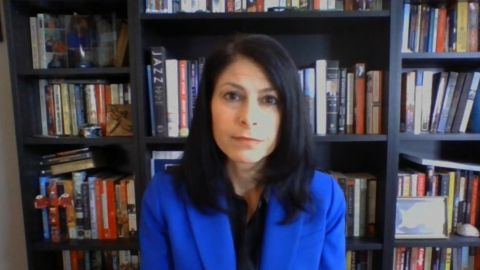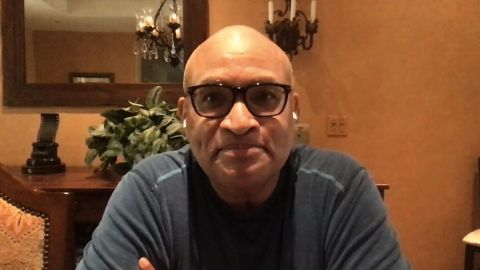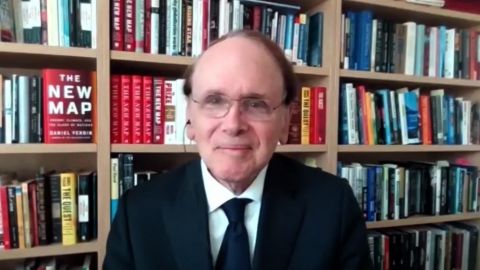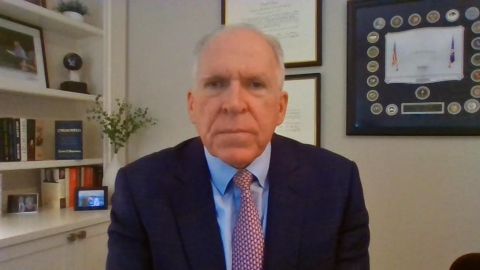Read Transcript EXPAND
CHRISTIANE AMANPOUR: The issues of fracking, emissions and energy demand preoccupy our national guest. He’s Daniel Yergin. He’s a Pulitzer Prize winning author and energy expert. And he served as an adviser in the last four administrations. His latest book, “The New Map: Energy, Climate, and the Clash of Nations,” looks at just how it shape America’s position in the world. And here he is talking to our Walter Isaacson about all of this and the most promising new solutions out there.
(BEGIN VIDEOTAPE)
WALTER ISAACSON: Thank you, Christiane. And, Dan Yergin, welcome to the show.
DANIEL YERGIN, AUTHOR, “THE NEW MAP”: Thank you. Glad to be with you.
ISAACSON: Before we get to the politics of the moment, explain to me what the shale oil revolution is all about and how it’s impacted our country.
YERGIN: Walter, you are a student of entrepreneurs and stubborn people who make things happen. And the shale revolution is congruent with that understanding. There was one person in particular who was just convinced for 18 years that you could do this, and people thought it was a crazy, said, you’re wasting your money, said, it’s my money. It was a public company. But he controlled it, and finally had a breakthrough in the period — 1998 to 2003 is when it happened, and it really built together two technologies, because petroleum textbooks had said that this was possible, that you couldn’t get oil and gas out of this very dense rock called shale. It turns out you can. And then, with the other technology, which depends on advanced computer capabilities, basically, you can drill horizontally two miles under the Earth. Those two things are the two technologies that brought shale together and turned this area of Texas and New Mexico into — called the Permian into the great rival of the largest oil field in Saudi Arabia.
ISAACSON: You wrote a wonderful book call “The Prize,” which talked about America’s dependence on oil. Suddenly, things changed with the shale oil revolution. How has that created what you call the new map of energy?
YERGIN: It’s turned things around 180 degrees, where the U.S. used to really worry about energy dependence, importing 60 percent of its oil, today, the United States is the world’s largest producer of oil. And that’s changed economics. It’s changed psychology. And it’s had a big impact on international relations as well.
ISAACSON: You talk about LNG, meaning liquefied natural gas. Does that help the United States export its newfound shale gas?
YERGIN: Well, certainly, this is — our trade balance would be hundreds of billions of dollars higher — our imbalance, rather, negative balance, were it not for the shift away from being an importer, and, indeed, to becoming an exporter. And you can see, in Asia, even with the tensions with China right now, China is a significant importer of energy from the United States. It’s part of the trade deal that was negotiated at the end of last year.
ISAACSON: What do you think a Biden energy policy would be for this new map?
YERGIN: I think the Biden energy policy will first and foremost be, as in his $2 trillion climate plan, focused on climate, on moving towards lower carbon, a whole host of different measures. At the same time, I think we heard him say, I will not ban fracking. In fact, he said, I repeat, I will not ban fracking. And I think it’s a recognition this is a big industry that, before COVID, employed over 12 million people in the United States. And it’s a big — it’s a big economic sector. And he’s a former chairman of the Senate Foreign Relations Committee, recognizing that it also has global political impact.
ISAACSON: And what would a Trump second administration energy policy look like to you? And how would it check out geopolitically?
YERGIN: Well, I think it would be pretty much like the first Trump administration energy policy, which is focused on the continued development of this. And in “The New Map,” I point out that Donald Trump has become the world’s leading, number one LNG salesman, as he’s gone around the world telling other leaders that they should buy natural gas from the United States, not from other people, including not from Russia.
ISAACSON: In your book, you describe all the innovations that led to unconventional extraction of natural gas and then oil, known as fracking. Is it really dangerous, the way people say?
YERGIN: Walter, if it was really dangerous, we wouldn’t be — produced 13 million barrels a day of oil in this United States in February of this year. I was on the commission, worked with the Obama administration when they reviewed the environmental questions around shale. Shale is an industrial activity. The production of it, it needs to be regulated properly. And it appears, every day, that it’s — it is indeed regulated and we’re producing it. So I think that there’s an emotion around it. But, in fact, the reality of it is, it’s an industrial activity that continues and works. If it was a big environmental problem, you would hear a lot more about it, other than just that it’s a big environmental problem. You would see, hear specifics. There aren’t very many.
ISAACSON: Joe Biden has said that he would continue the practice of fracking. Is that a good idea? Is fracking a good thing?
YERGIN: Well, I think that it’s become a very emotional term. And I think a lot of the emotion that was around it is still there, and you hear it in the campaign, is not very connected to the actual activity, but, rather, it’s become more of a bumper sticker. If you — quote — “ban fracking,” if you really severely restricted it, it would really be an import-more-oil policy, because that would be the consequence, because there are 280 million cars in the United States that run on — most of them run on gasoline, almost all of them.
ISAACSON: But the concerns about water contamination, methane that make people oppose fracking, what are your thoughts on that?
YERGIN: I think the water contamination issue has been pretty much dealt with. And over the last 10 years, we have had very few instances of that. I think methane is a big question. Methane is a very potent greenhouse gas. And I think there is a drive, and I will — I think there will be an intensified drive to control methane emissions. And I would put that as a real priority.
ISAACSON: But could fracking and nuclear help solve the climate crisis?
YERGIN: I think fracking deals with a here and now, the 280 million cars in the United States. You need natural gas, actually, now to balance out wind and solar, when they’re not operating. Nuclear could be — a new generation of nuclear could be a very significant advance in terms of zero carbon production. And that’s why I think you see so much activity around it.
ISAACSON: The Green New Deal that’s been proposed by some in the Democratic Party is something that Joe Biden has said is not doable and he’s not fully in favor of now. Do you think the Green New Deal is a feasible plan?
YERGIN: Well, no, I think that, if you look at our economy today, 80 percent of our energy comes from fossil fuels, under 4 percent comes from renewables. I think, directionally, we’re going to move towards a lower and lower carbon future. But it takes a big time. We have a big, complex economy, and you can’t change — you can’t change it overnight. There are jobs. There’s just the way society operates. But I think, directionally, we’re going there, but I agree with Joe Biden that trying to achieve these goals by 2030 is highly impractical. And the resources aren’t there. And one of the things, Walter, that people don’t even look at is, if you want to build wind and solar and make all these changes, what kind of new supply chains do you need? Seventy percent of solar panels come from China itself. And another 10 percent come from Chinese companies and other and other countries. So, you don’t turn a ship as large as our economy or the global economy in 10 years.
ISAACSON: What is the most promising new energy technology then?
YERGIN: I think the thing that’s — one thing that’s critical in the future are batteries, and battery costs are coming down, because, if you can store wind and solar, which are called intermittent, because they depend upon the wind blowing, the sun shining, if you can store it, then that would certainly accelerate the role of renewables. I think a second thing that’s part of it is what’s called carbon capture, which means capturing basically the carbon that is produced in using oil and gas and coal, but particularly oil and gas, and capturing it, changing it into — sequestering it in some way. I think those are kind of the top — among the top technologies. I think another one that’s out there that’s getting a lot of attention right now is, can we use hydrogen as a replacement for natural gas in heating and electric generation? Wind and solar, as businesses, Walter, are 50 years old, the modern wind and solar industry. It was only 10 years ago that we started to see them really become mature. And I talked — we talked about shale revolution. There’s also a solar revolution. Solar costs have come down a lot. So, innovation — I mean, you are focused on innovation technology. You know that it doesn’t happen quickly, and it often takes different things coming together to give a result.
ISAACSON: How has Russian President Vladimir Putin used energy, and especially energy pipelines, to assert his own geopolitical desires?
YERGIN: Certainly, Russia’s restoration as a great power, which has been one of Putin’s great ambitions, is very much tied in with the fact that it’s an energy superpower. He once said: I don’t regard — I don’t want to use the word superpower, because it sounds too much like a cold war. But now, of course, we see signs of new cold wars. And I think that he has gained influence and power from it. Sometimes, it can be overstated. I mean, first, it’s very important to him in terms of revenues. But it can be overstated, because people worry about, is Europe using Russian gas? It uses a fair amount of Russian gas. But Europe also has a lot of other choices, gas from other countries, LNG again, liquefied natural gas, imported from Qatar, Australia or the United States. So, Europe has a lot more flexibility. But where energy really shows up is in this growing alliance and alignment between Russia and China. And once upon a time, the relationship between Russia, the Soviet Union, and China was based upon Marx and Lenin. To a significant degree today, it’s based upon oil and gas.
ISAACSON: And Russia and China have created a pipeline that will tie them together even more closely, right?
YERGIN: Yes, it was just around the same time that the United States put sanctions on this Russian pipeline that would run under the Baltic Sea from Russia to Germany called Nord Stream II. Within weeks of that, Putin and Xi Jinping had this very complex ceremony in which they pulled the switch, gave the command, as they said, to start the flow of Russian gas from Russia to China. And the pipeline has a name that sends a big message. It’s called Power of Siberia.
ISAACSON: In your book, you have a wonderful scene where Russian President Putin is yelling at you about American shale, oil and fracking, because he feels it’s going to undermine his foreign policy. Describe that to us.
YERGIN: This — I was at a conference. And Putin and Chancellor Merkel were together on the platform. And I had the opportunity to ask the first question. I meant to ask him a question about, what are you going to do to diversify your economy, so you’re not so dependent on oil and gas? By accident, I mentioned that word shale. And that’s when he started shouting at me in front of about 3,000 people. And he shouted at me, because he saw shale, U.S. shale, doing two things, one, taking market share away from Russia and Russian gas. And we have seen that with U.S. shale going to Europe. And, secondly, I think the Russians – – and we saw this again last — earlier this year — the Russians do see U.S. — the U.S. new energy position, shale, as basically an adjunct to U.S. foreign policy, giving us the flexibility, the U.S. a flexibility it didn’t have before. Whether you backed Obama’s — President Obama’s approach to Iran, President Trump’s, or what might be President Biden’s, it doesn’t work without our shale oil, because the Iranians said, we don’t have to negotiate with you about nuclear weapons — nuclear — their nuclear system, their weapons and capabilities, because you can’t live without our oil. It turned out the world canned about their oil. And part of that is because American oil replaces Iranian oil in the global market.
ISAACSON: So, are you saying that we have to keep extracting shale oil and doing fracking in order to contain both Russia and Iran?
YERGIN: Well, I think it is — I think it is part of the portfolio of what the United States, the U.S. position in the world, to deal with other problems. And to use that word again, it gives us flexibility. I have also seen that it gives us a new dimension of influence. I have seen it in terms of India, where the export of U.S. oil and the export of liquefied natural gas to India has become a very big deal in the U.S.-Indian relationship, and a very positive in what has been previously a complex and more difficult relationship. It’s not the only element that ties the countries together. But it’s something that I have personally seen with Prime Minister Modi about the importance of this. And I think, sometimes, in this country, we don’t realize how much other countries look at the position of the United States and wish they had something similar.
ISAACSON: How will this new energy revolution affect the power balances in the Middle East and our relationship to the Middle East?
YERGIN: I think we already see how this shift in energy is changing power balances. On the one hand, it’s given the United States this opportunity to pursue, under Obama, and differently under Trump, a policy of seeking to contain Iran’s nuclear program. It’s certainly reduced our dependence on the global oil system. And I think it’s also figured into the thinking of some of the key countries in that region on the Arab side of the Persian Gulf, in terms of, well, the U.S., maybe just be, beyond Iran, not that interested in this region in the future. And I think you can also see the impact of this in terms of this historic breakthrough agreement between the United Arab Emirates and Bahrain with Israel. There are many factors that went into it. One is the thought that the United States may not maintain that, its long-term interest in the region, and that it would be, from a security point of view, those countries should look for other partners into terms of security and technology. And so I think that’s one consequence too of this shale revolution.
ISAACSON: Your grand first book was about the origins of the Cold War with the Soviet Union. Do you see the same things happening or some of the same things happening with a new cold war with China?
YERGIN: Walter, when I finished that “Shattered Peace,” that first book, I never really thought I’d be writing another book about origins of the cold — new cold wars. The last two years, as I finished “The New Map,” I really started to feel that we’re certainly headed in that direction. The Soviet-American Cold War, a lot of it was about — focused on nuclear weapons. With China, it’s much more complex, because we’re — and the Soviet Union was not a major factor in the global economy. We’re really quite connected, interdependent with China, as they are with us. And China is deeply embedded, of course, in the global economy. So, it’s a different kind of competition. Right now, I would say the term that get used is strategic competitors, great power rivalry. But, as — in just what we have seen in the last few months, that this relationship has gotten more and more difficult, more and more challenged. And I think we could find ourselves in a different kind, a 21st century cold war. And I think how to deal with the situation and manage it is going to be a very tough job, maybe the single most important foreign policy issue facing the United States in the years ahead.
ISAACSON: Dan Yergin, thank you so much for being with us.
YERGIN: Thank you, Walter.
About This Episode EXPAND
Christiane speaks with former CIA Director John Brennan about the state of the nation. She also speaks with Michigan’s Attorney General about the foiled plot to kidnap the state’s governor. Former “Daily Show” correspondent and comedian Larry Wilmore discusses his new series. Walter Isaacson speaks with energy expert Daniel Yergin about how energy shapes America’s position in the world.
LEARN MORE



